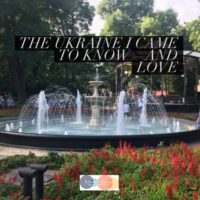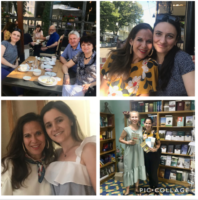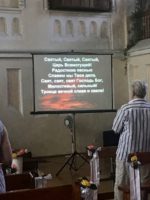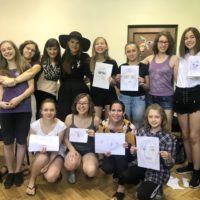
On a Monday morning in June of 2019 a Birmingham friend messaged me with a last-minute opportunity to travel to Ukraine. She was going with other Christian counselors to train Ukrainian counselors and minister to Ukrainian believers and missionaries. By Wednesday I made the most out-of-character, sporadic decision I’ve ever made. On Friday I was on a plane to a part of the world I knew nothing about. Heck, I wasn’t even correctly saying where I was going–it’s Ukraine, not “The” Ukraine–but you probably know that since Ukraine is now in the news daily with Russia’s impending invasion.
Russian troops are no longer just across Kiev at the northern border, as was the case when I visited Ukraine. Today, their troops are positioned around the eastern and southern borders as well, which means Russia could potentially come from their own territory of Crimea just across the Black Sea from Odessa, Ukraine where I was.
War on the other side world doesn’t often rile us, especially in places we know nothing about, so I want to introduce you to the people of Ukraine I fell in love with. People riddled with despair.
But despair is not new to Ukraine. War, addiction, abuse, financial hardship, broken relationships, and hopelessness generally characterizes the people of Ukraine. Since 2014, 14,000 Ukrainians have been killed and over 2 million displaced from them homes because of the fighting*. The exchange rate has plummeted, and Ukrainian resource production has drastically slowed causing even more economic fallout. We were told the average Ukrainian family makes the equivalent of $200-$400 a month. The medical clinic we visited did not have a single patient, not because people weren’t in desperate need of medical attention, but because they couldn’t afford to come. In the same village as the clinic, the pastor and his church were personally caring for and assisting five Ukrainian refuge families who had fled from their northern town on the Russian border.
For Middle-aged and older Ukrainians, they remember what it’s like to not live in a democracy. They grew up when Communist controlled everything, including what jobs individuals had. One individual shared with us that he had wanted to be a doctor but was not allowed that choice. The lack of freedom cultivated despondency, which in turn led to a culture of pervasive addiction and abuse. As communicated to me, many men during that time would go to the bars after work. It was all they had to look forward to. But what was intended as a coping mechanism turned into rampant alcoholism among the men and emotionally neglected, if not also abused, women and children.
The impact of childhood trauma, addiction, and abuse is ongoing today. Relational brokenness is evident in Ukraine’s high divorce rate, frequency of extra-marital affairs, and intimate partner violence (IPV). Ukrainians who shared their stories with me personalized these statistics.
Eating disorders, too, are high. The women, who are stunning, frequently feel as if they must make themselves beautiful enough to capture and keep the attention of their man. Interesting to me, on the cobblestone streets of Odessa I noticed women almost always in nice dresses and high heels despite the 90-degree heat, while men typically wore athletic shorts and t-shirts. When I mentioned this observation to a teen girl in the group I co-led, she remarked that “women are supposed to wear dresses.” Under the pressure to attain the beauty ideal is a culture of women hiding brokenness and seeking worth.

For the Christian 20-somethings, scarcity isn’t limited to financial resources. Lack of Christian fellowship, and Christian men to date ranks high on their list. Christians in general in Ukraine are small in number. While many Ukrainians identify themselves as Orthodox Christians, the state religion is more a national identity than a personal faith. And now under Russian aggression, religious liberties in some regions are under attack with more churches deemed illegal and printed literature banned.
AND YET–the believers I met in Ukraine exuded joy! In view of their difficult circumstances, the quickness in which we Westerns doubt God’s goodness and presence was glaring. The Ukrainian Christians know more as Paul did than I what it means to be content in all circumstances.

God’s grace is alive in Ukraine despite what every statistics shows to also be true. How grateful I am I was able to experience what life in general and a life of faith is like in Ukraine. One of my favorite memories is singing “Holy, Holy, Holy” alongside Russian speaking Ukrainian brothers and sisters in Christ. As different as our lives and experiences are, as humans we all know suffering and pain. We all know the need for hope, the desire for love, the longing for security. In Christ, we have been given it all perfectly. In Christ we are more alike than different.

Will you pray for these dear people as well as the missionaries there that they would experientially know the surpassing peace of Christ?
Will you pray for those in Ukraine who do not know the Lord that the uncertainty of a looming war would create ripe opportunities for them to hear and trust in the good news of Christ Jesus?
Will you pray that this war would not happen, that Ukraine would remain a democracy, and the gospel would continue to go forth to a people who need the hope of Christ?


If you would like donation information for the Christian counseling center or on the ground mission’s teams, please message me.
* https://www.christianitytoday.com/news/2022/january/ukraine-russia-border-churches-donbas-luhansk-donetsk.html
